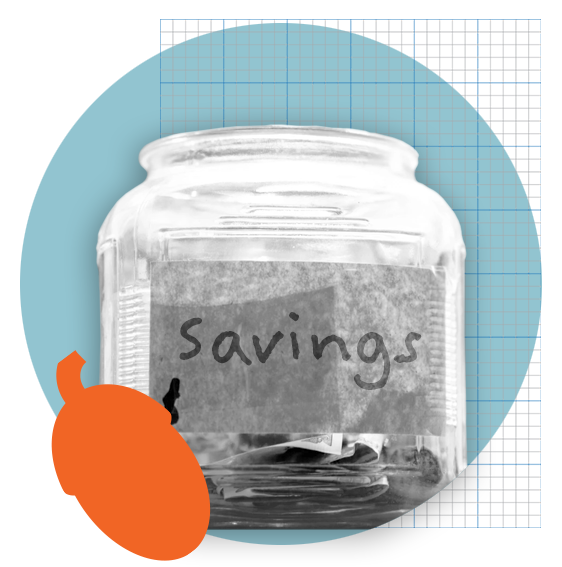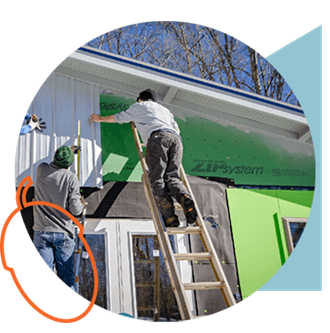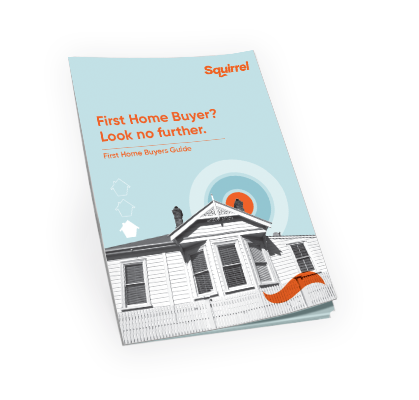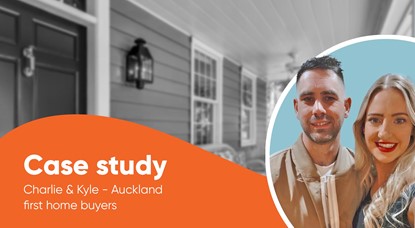Everything a first home buyer needs to know about getting onto the property ladder


Get the complete first home buyers guide
We've spent the last 10 years helping kiwis get into their first homes. As you can imagine, we've gotten pretty good at it. So we thought why not compile the knowledge we've collected over the years and tips into a booklet? The info's all here on this page, or you can download the booklet in PDF format for later.
Will I be able to get a loan?
Short answer: probably. Lending criteria is different from bank to bank so we’ll help you shop around for the best deal. If you go direct to your bank you’ll have less chance of securing the right loan (or any at all) because they can only give you one solution.
What paperwork is required?
Quite a bit, but we try and reduce it for you. First you have to fill out a form with all your assets, debts, income and expenses. You’ll need to prove your income, that you have a deposit saved and three months of bank statements. The bank and your Squirrel mortgage adviser might also run credit checks.
Which bank has the best rate?
Free TVs and cash in the hand seems like a sweet deal. Don’t be fooled though, there’s more to this decision than which room you should turn into a cinema.
Why use a mortgage adviser at all? Why not go straight to the bank?
Good advice and a ton of experience. We help you through the whole buying process (not just the mortgage). Property will be one of your largest financial investments. When it goes wrong, it can go horribly wrong! Mortgages (and helping people like you buy property) are what we do
– so we know all of the things to look out for. As mortgage advisers we also have more options available to us when it comes to finding a mortgage solution. Lenders have very different credit policies. By only talking to one lender you are potentially selling yourself short and getting a poor deal. Why take the risk when our service to you is free?
Can I borrow 100%?
In short – no! Banks will happily lend up to 80% but if you have good income we can most likely get you to 90% and for some 95% but the borrowing costs are higher. Other options to think about are to use parents as a guarantor or vendor finance. If you have high income but low deposit, you could be eligible for Launchpad which allows buyers to borrow up to 95%. Find out more about Launchpad here.
How long does it take to get finance?
It normally takes less than three days to arrange finance but it pays to get organised ahead of time. Every now and then, the banks can be a bit slow, especially if the mortgage is over 80% of the property’s value. So, if you are borrowing over 80%, allow for at least 5-7 working days to get an approval. Bottom line is, the earlier you talk to us and get things rolling the easier it’ll be for all.
Where should I live?
When you’re deciding where to live there are lots of things to consider.
Some of it’s rational, but lots of it will be emotional. If you’re a couple buying together you’ll probably have differing priorities, so finding a middle ground can be a fantastic lesson in compromise. You’ll need to consider how you want to live and how long you’re planning to stay. Do you want to be close to friends and fun places to eat out? When it comes to commuting, how far is too far? If you have kids or are planning them, are the schools and community to your liking?
- What is the neighbourhood like?
- Is it quiet at night?
- Is there much crime in the area?
- What happens when it rains?
- Are neighbours aware of any future development activity?
Whatever you decide, there are a few more things to take into account:
Location, land and community
It really is true that it’s better to buy the worst house in a good street – and it’s not just because the value of your house will go up. You may not realise just how much impact your community can have on you – horrible neighbours can make life hell.
Follow the sun
Amazing what a difference a bit of sun can do for even the most run-down property. Make sure you double-check the aspect of any house, so you know where it gets the sun and what rooms will be the warmest.
Do your research
Get your sleuthing hat on so you know everything about the house before you buy. Talk to neighbours, run Google searches on the house, street and area, check at night for street lighting and noise.
Freehold
This is where you own the whole lot, including the land. Long-term, the value of your property will be in the land.
Leasehold
With leasehold you own the building but you don’t own the land. Banks will generally only lend up to 65% on leasehold property.
There are typically two types of leasehold. Church and Maori leasehold tends to be lower risk and better quality because they’ve been around longer and are more consistently priced. Commercial leasehold is riskier. Many of the inner city apartments that have developed recently have used low “honeymoon” lease costs that jump up as much as 100% at the next ground rent review date.
Your key considerations are how long it is until the next review and how much will they increase?
Leasehold can be really useful in some cases. It allows people to live in areas and in a quality of building they otherwise could not afford. The most important thing is making sure that it’s priced properly.
Cross-Lease
This was popular in the 70s and 80s as a cost effective way of subdividing properties.
Essentially you own a share of the freehold title. The only thing to be aware of with cross- lease is that it may need sign-off from other owners before you can change the footprint of your house. Although uncommon, there could be other restrictions on the title that need to be checked out by your lawyer.
Strata or Unit Title
This form of ownership is common for apartments, townhouses and units. It is used to ascribe ownership within a development. You will have ownership of your unit and an undivided share in the ownership of common areas.
There will be Body Corporate fees associated with unit titles that pay for the upkeep of the common areas and services.
House
Usually has a roof, windows and a door. Like Playschool, only real life.
Townhouse/Units
These are semi-attached and usually on a cross-lease or strata title. Banks are a little more nervous about town houses in larger developments so may restrict lending to 70%. They tend to be more favourable towards properties built in the 70s and less favourable towards anything built after 1985. Clearly, they don’t make them like they used to.
Apartments
Apartments are increasingly popular with buyers because of the low entry prices, though they’re not viewed positively by lenders. This can make it much more difficult to get a mortgage on an apartment, but has also seen the price of apartments drop. Some banks are not lending on apartments at all anymore, so it’s worth talking to us first if you’re thinking of grabbing an inner city pad.
Apartments are a bit of a weird beast. Often banks won’t lend on the cheapest places at all because they’re too difficult to rent. For apartment like these, which tend to be less than 50sqm or leasehold, you’ll probably need a 40% deposit. Larger apartments with two or more bedrooms that are freehold will need at least 20%-30% deposit as long as you have a good stable income.
To really educate yourself on apartments, spend a night at a tired, old, cheap hotel (just take your own pillow). You’ll notice what happens to apartments that are cheaply made and not well maintained – it feels really run down, shared areas will be scruffy, views blocked by newer buildings and street noise will be very noticeable. Apartments with potential will be soundly built and mostly owner-occupied, with safe entry and exit from the building at night and great proximity to supermarkets, parks and transport.

Pre 1940
Built with native timbers these were built pretty solid so last fairly well.
Things you should watch out for:
- Some insurers will need old wiring to be completely replaced before they’ll sign off on replacement-cost policy. You’ll generally need this kind of policy to get your home loan so make sure you check this out before going Unconditional.
- These houses often need to be re-roofed, costing around $10k and re-piled, around $15k.
1940 - 1960
This period tended to have small windows and cramped living spaces to trap in heat. You’ll often find the layout in these places are at odds with modern living, so you’ll need to move to walls around. That makes them expensive do ups.
1960-1985
Not only are houses in this era pretty fashionable at the moment, they’re made from enduring materials and are often positioned well for sun with great indoor-outdoor flow. Asbestos was widely used in the 1960s and 70s. Asbestos is safe if you just leave it alone (kind of like a pimple). Check whether or not internal ceilings are asbestos because some lenders will restrict lending to 80%.
Asbestos ceiling can be removed by specialists for around $5k.
Insulation only became compulsory in 1979, so houses built before then might not have any. Brick and tile houses will be particularly cold and have issues with mould – look for it on south-facing walls.
1985-2003
This is the era of dodgy building practices and the infamous “leaky building”, so it pays to be careful.
Things to look out for:
- Monolithic cladding systems (“plaster houses” and panelling)
- Lack of eaves (roof overhangs)
- No window flashings (integrated metal trim above a window that deflects water)
- Balconies integrated into the cladding system (“solid”)
- Cladding or framing touching the ground
2003+
New building codes fixed the dodgy practices of the previous decade. Enough said.
Auction
An auction is where you get into a room and yell about buying a house. If you win, it’s considered an unconditional purchase, so you need to do all of your due diligence homework beforehand. The real estate agent will have given you a copy of the sale and purchase agreement, title and maybe the LIM report. You may need to do a building inspection and valuation. This can get a wee bit expensive if you keep bidding at auction, so it’s best to be choosy.
You’ll also need to register your interest in the auction before the day and be able to front up with a 10% deposit if you win.
Auction checklist:
- Register your interest with the agent before the day
- Agree any changes to the deposit or settlement day with the agent before the auction
- Have your solicitor check the title
- Get your finance fully approved
- Read the LIM report and do any other due diligences
- Do a building inspection or valuation (if required)
- Arrange your 10% deposit (check out our page on deposit bonds for help with this)
Tender
A tender is like dating. You put in a written offer with a specified timeframe and the vendor considers your offer alongside others. You can put conditions on the offer but this might make it less appealing than others.
Private Treaty
A private treaty is buying by negotiation and lets you put conditions into the sale and purchase agreement.
Private Sale
Private sales are the same as Private Treaty but are worth covering separately because you’ll be negotiating directly with the vendor. Because no one will be managing the process and spotting the issues early there’s more chance that something will go wrong. If you buy privately you’ll need a registered valuation and should have your solicitor check the agreement before you sign. The
alternative is to insert a solicitors’ clause, which is like a Get Out of Jail Free card – if the solicitor’s not happy, you have three days to get out of the agreement.
Sale & Purchase Agreement
Once you find a place you want to buy you’ll need to sign a sale and purchase agreement. This is basically just a template where you can insert your own purchase conditions.
- We’ve outlined the main conditions below:
- Subject to finance – generally 5 to 10 working days
- Subject to building inspection
- Subject to LIM report
- Subject to solicitors approval – 3 working days (insert this if you are not confident about what you are signing)
Another popular condition is a due diligence clause that gives you full control on the purchase process
– unsurprisingly, this isn’t nearly as popular with agents as it is with buyers. Remember though, this is a legal contract and the point of no return; once you go unconditional you’re committed to purchasing the property. It’s mostly not as ominous as that sounds.

Paying the deposit
You might find that you don’t actually have the deposit available when you buy a property. Rather than searching down the back of the couch to make up the difference here are the rules and the process you should follow:
- The amount of a deposit is completely negotiable.
- Auctions are set at 10% deposit, but you can negotiate with the real estate agent before the auction if you don’t have it on hand. Agents and vendors will want as many bidders as possible at the auction so will generally agree to a lower deposit.
- With private treaty (by negotiation) sales you set the figure when you sign the sale and purchase agreement. 5% is usually enough. With bigger purchases you can usually cap the deposit at a set amount, say $25k, which is pretty handy.
If you're using KiwiSaver, You can now withdraw funds to put towards your initial deposit (previously this was only possible upon going unconditional). If you have a conditional sale and purchase agreement you can choose to make your withdrawal at the point of deposit or when you settle.
When does the deposit get paid?
You normally agree to pay the deposit once the sale goes unconditional. Occasionally real estate agents ask for the deposit upfront but this isn’t all that common.
Although it is best to pay the deposit on the day you go unconditional, this is often not possible because of the amount of paperwork required to get temporary facilities in place. If this is the case, you can go unconditional and just let the agent know that the deposit will be paid within 48 hours.
Always check with your solicitor – you have three working days from being served notice (by the vendor’s solicitor) to pay the deposit. This means you have at least three working days from going unconditional to pay it. That’s enough time to search through a few couches – or set up alternative arrangements.
Remember: The KiwiSaver rules changed recently to allow the early release of funds to be used as a deposit. This needs to be managed through your solicitor and is worth getting underway as early as possible.

How do I get a building inspection and valuation?
Once you’ve signed a sale and purchase agreement we can arrange for a building inspection and valuation and have these available for you before going unconditional.
What the heck is a LIM report?
A LIM report is a document that will put you to sleep if you read it too close to bedtime.
But it's an important doc prepared by the council and is based on its property records. It will tell you whether or not the property has the right consents and a code of compliance. You’ll have to order a LIM report from your Council, which will cost around $250-$350. It often takes up to 10 days to get it too, so order as soon as you’ve signed the sale and purchase agreement. Or if you like looking at heavy documents you can check the council’s property file yourself.
Sometimes, if you're lucky the Real Estate Agent might have it and email it to you at no cost.
Choosing a lawyer and signing contracts
Your lawyer is a necessary evil in the house-buying process. You’ll find there’s a huge difference in quality of service, advice and cost from all the lawyers out there, so it’s really a question of what you need.
If personal service is important then pay extra and go to a reputable law firm. There are also a number of low cost transactional services available, which work great if you’re an old hand and don’t need lots of advice or reassurance.
Your lawyer will confirm that you would like to go unconditional with the vendor, check that the title of the property is clean, run through the mortgage documents with you, and settle the funds.
If you are outside of the city or overseas, they’ll courier the mortgage documents. You’ll need to sign them in front of a Justice of the Peace or Public Notary. For non-residents you don’t need to come to New Zealand to buy property – just allow enough time for us to send the paperwork back and forth.
Buying tactics
There is no doubt that the process of house shopping is a challenging time. So what tactics can you use to become that smart buyer who has the upper hand?
It’s a competitive world out there and only the tough survive, or in property terms, only the smart ones walk away with the right house at the right price.
Firstly - be first!
Make sure you are up to speed with the market as it moves day-to-day. Subscribe to email alerts from Trade Me Property and Realestate.co.nz and read them when they come in. If you act, you can be ahead of the game and make sure you have that extra time to undertake the due-diligence required on a property even before the first viewing. So much researching can be online, it’s as simple as searching the address on Google.
Don't wait for the first open home
Call up the agent and be forward, state your desire to view the property. Don’t be put off by talk of waiting to queue up with all the others at the weekend. If the property is on the market, then it should be ready to view at any time.
Acting in this forward manner may be the opposite of what people tell you in ‘not being too keen and hold your cards close’, but being assertive can be a powerful tactic, it can de-stablise the meticulously planned campaign and programme of the agent!
Be prepared
Another aspect of being that smarter buyer is to make sure you have all your paperwork in place and have the financial arrangements confirmed with the lender. If you take this forward, confident approach, you want to be ready to act and act quickly to make an offer. A clean and ideally unconditional offer well ahead of anyone else is the key.
Fewer properties are going to auction these days as the heat has come out of the market, the heat that caused irrational behaviour last year with short notice auctions. Today sellers are being conditioned to expect a slower pace and property taking longer to sell. So get in quick. Inspect the property, do the due diligence and get an offer on the table before the rest of the mob have even been to the open home. Be aggressive with the offer, couple that with the pace of your action and
you will have the agent telling vendors that they need to take this offer seriously – after all, you would not act so hastily if you were not serious.
The one thing that plays to your favour is the well- known expression shared with vendor by agents. “The first offer is often the best offer”. Be sure to play that card to your full advantage and let the vendor consider the classic conundrum of a “bird in the hand is worth two in the bush”.
Approach owners directly
Another idea, somewhat of an unusual approach you might like to consider is to actually approach the owners of a property which meets your criteria and
based on your insight into the local market properties you think meets your budget. It may sound odd, but approached the right way it could pay off. Instead
of knocking on the door and saying “have you ever thought of selling your house” to the person who opens the door, approach it in a more considered way, by writing a letter.
The letter should approach the situation from your perspective. Share your circumstances in respect of your desire to live in the area, your financial situation and your respect that the owners may need time to think about it. Offer the opportunity for a registered valuer to undertake a valuation of the property at your expense. Highlight how a professionally negotiated private sale could provide considerable savings for them and benefits to you. It is worth a try, you will never know unless you ask. People often wonder if someday, someone will rock up to their house and offer to buy it!
Write a letter
An idea for the smarter buyer is to add a personal touch to an offer. Try writing a letter to the vendors to accompany the offer. Sure we all believe that we will always take the best offer irrespective of the circumstances, but you would be amazed how much difference a personal handwritten letter can make.
Share your desire to buy the house and explain why. People get attached to houses and it is not uncommon for owners to be keen to see the new owners as ‘like- them’ in some ways, a family to take care of the house. A touch of empathy can go a long way; and again, nothing ventured-nothing gained!

Can I use my KiwiSaver?
If you are a first home buyer you can withdraw KiwiSaver contributions made by you and your employer to use as a deposit towards your new home. You can only do this if you’ve been on KiwiSaver for more than three years.
In addition, if your household income is less than $150,000 and are buying for less than $875,000 in Auckland, you may be eligible for a First Home Grant of up to $5,000 per borrower for existing houses, and up to $10,000 per borrower for new builds. (See full eligibility below).
For existing houses, the First Home Grant is $1,000 for each year you’ve been in KiwiSaver, up to a maximum of $5,000 for five years. If you’re a couple buying a house together and you both qualify for a grant, you could receive a combined grant of up to $10,000.
If you are off plan or building new then you could double your First Home Grant up to $20,000 for a couple.
To be eligible to withdraw some or all of your KiwiSaver you must:
- have been a KiwiSaver scheme member for at least three years;
- be planning to live in the house for at least six months, and
- be buying your first home.
To be eligible for the First Home Grant you must:
- have contributed at least 3% of your income to a KiwiSaver scheme for at least three years
- be planning to live in the house for at least six months,
- have a single income under $95,000 or a combined yearly income of $150,000 or less (before tax) two buyers,
- not currently own any property (this does not include ownership of Māori land),
- be buying a house under the regional price caps.
Find out more about the current regional price caps as well as the full eligibility criteria on the Kāinga Ora website.
First Home Loan
The First Home Loan (previously known as the 'Welcome Home Loan') is a unique loan designed to make it a bit easier to get into your first home. The biggest benefit is it allows first home buyers to purchase with as little as a 5% deposit, as long as the criteria is met.
First Home Loans are issued by selected banks and other lenders and are underwritten by Kāinga Ora. This allows the lender to provide loans that would otherwise sit outside their normal lending standards.
To be eligible for a First Home Loan you need to meet certain minimum criteria:
- Income cap: You can have a maximum yearly income of up to $95,000 (before tax) for 1 person.
- Or a combined maximum yearly income of $150,000 (before tax) for 2 or more people.
- Minimum deposit: You will need a minimum 5% deposit
- NZ Citizen: You need to be a NZ Citizen or NZ Permanent Resident.
- Be a first home buyer, or a previous home owner that is in a similar financial position to a typical first home buyer.
For more information and full eligibility criteria, jump over here.
Launchpad - the low deposit loan for higher income earners
For those who are ready to take on mortgage repayments but haven't quite got the deposit together, Launchpad, our very own first home loan might be the answer.
- Buy with as little as 5% deposit (lending criteria applies)
- Competitive interest rates
- Best of all, it’s a leg up onto the property ladder

Stay in the know with what's going on
Our blog has tons of helpful information, tips and advice for first-time home buyers. Knowledge is power, so use it to get ahead of the pack.
All articlesHow saving with Squirrel could get you into your first home faste...
If you've been working hard to get to that 20% house deposit, you'll want to make sure your savings are working as h...

A Squirrel case study: Charlie & Kyle
In this case study, we sat down with Auckland first home buyer, Charlie, to chat about her (and partner Kyle's) jour...
Beyond the purchase price: The 5 big costs to be aware of as a fi...
Buying a home is (probably) going to be the biggest investment you’ll ever make. As a first home buyer, when you’re ...

KiwiBuild
KiwiBuild is a government-led project with a mission to build affordable and comfortable homes for kiwi first home buyers. They're focusing on areas around New Zealand where prices are getting higher and home ownership is getting lower. If you fit the criteria it's a pretty sweet deal. Find out more about the initiative and whether you'll be eligible for a piece of the pie here.


1. Poor account conduct
This is when being silly or forgetful with your money can come back to haunt you. Your home loan won’t be fully approved until the bank has seen your bank statements. Dishonoured direct debits or going into unarranged overdraft can make you look like a risky prospect and you could be declined.
2. Looking in all the wrong places
A number of first home buyers start their hunt looking at properties (and going to auctions) well above what they can afford. Eventually they get buyer fatigue and end up buying the first thing they can, which is never a great way of approaching it.
3. Putting offers on the wrong houses
If a place seems too good to be true, it usually is. Do some basic checks yourself before getting an inspection – look under the floor for dampness or rot and look for repairs.
4. Not checking everything works
A building inspection will throw up structural issues with a house but will miss the small stuff. It pays to check that everything works – heated towel rails, spa pool, dishwasher, dryer, drains, electric door to hidden lair, hot water, central heating, fans, and oven.
5. Not allowing for up front costs
You will have between $1,500 and $3,000 of upfront costs when buying property. Make sure you factor this in to your budget.
6. Underestimating borrowing costs
Banks will approve you for more than you can reasonably afford. It is important to have a realistic budget and to plan on higher interest rates. Putting your head in the sand simply creates problems later.
7. Changes in circumstance
If you are going to have kids, travel overseas, go back to study, or join a hippie commune – work out what that means in advance. If you need insurance, we can help with that.
8. Paying the minimum
If you only pay the minimum mortgage repayment you won’t get ahead and your mortgage costs will increase when rates go up.
9. Choosing the lowest rate
The lowest rate is often not the cheapest option – they can often come with hooks and hidden costs.
10. Buying "interest free" stuff for the house
Once you have a mortgage it gets harder to repay other debts. Although a hire purchase might be interest-free (and you might absolutely need it for your kitchen) at some point it needs to be repaid and will then impact.
Maximum Mortgage Term
The maximum term is generally 20 years for mortgages over 80% of the purchase price and 30 years for mortgages under 80%.
Frequency
Most banks allow fortnightly and monthly mortgage repayments. The best idea is to pay your mortgage as often as you’re paid – it’s not true that you’ll pay your mortgage off faster by paying fortnightly.
Interest-Only Mortgage
Interest-only terms can be for 5 or 10 years depending on the lender. Typically this option is only available to mortgages under 80% of the property value or purchase price.
Fixed Mortgage
Fixed rate mortgages give you certainty; you’ll know what your repayment amount is for a fixed term of between 1 and 5 years. Even if interest rates go up or down you pay the same, so you could miss out on savings, or avoid paying increases. If you repay a fixed rate early (like if you sell the house) you’ll end up having to pay early repayment fees.
Capped Mortgage
This mortgage type is generally way over- complicated and not very common in New Zealand. Essentially you get a floating rate that is capped in the event that rates go up.
Floating Mortgage
Floating rate mortgages give you more flexibility. They can go up and down at any time but this movement is closely tied to the official cash rate. With a floating mortgage you can pay it off as fast as you like without fees and easily redraw funds if you have already repaid more than you need.
Revolving Credit
This is essentially a giant overdraft on your transaction account where the overdraft is at mortgage rates. As long as you can resist the temptation of using all that credit for fun things like shoes and holidays, there are a couple of great benefits:
› It’s better to throw all of your savings at the mortgage and have undrawn funds in a revolving credit.
› Gives you easy access to funds and can smooth your mortgage if your income is lumpy or irregular.
Guide to buying your first home: Chapter 1
Guide to buying your first home: Chapter 2
Guide to buying your first home: Chapter 3
Guide to buying your first home: Chapter 4
Phew, you reached the end!
You're pretty clued up on how this house purchase thing works now. If you want to save any of it for later, our handy dandy PDF has it all in one spot. You can download it here.






